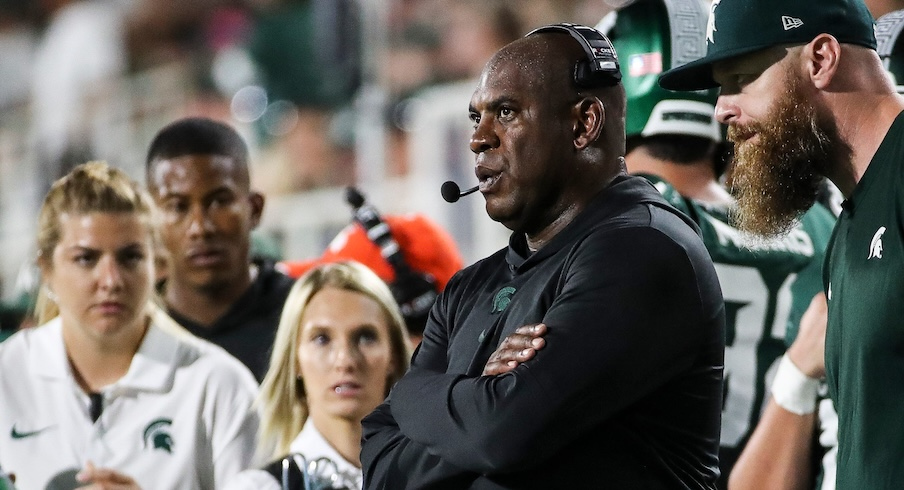Michigan State, not Michigan, had its wins vacated following an NCAA investigation into its football program.
In a negotiated resolution between the Spartans, the NCAA, and the Division I Committee on Infractions (COI), the following penalties were imposed on Michigan State football:
- Vacation of three years of wins (2022-24) due to the participation of three ineligible student-athletes
- Three years of probation
- A fine of $30,000 plus 1.5% of the budget for the football program
- Restrictions on official visits, unofficial visits, recruiting communication, recruiting-person days and off-campus recruiting contacts and evaluations over the three-year probationary period
- Show-cause orders for former staff members
In a statement shared on Wednesday, Michigan State president Kevin Guskiewicz and athletic director J. Batt said the Spartans accept the COI's penalties but expressed disappointment that the program's wins will be vacated.
"Today's announcement brings closure to an NCAA investigation resulting from violations committed by a previous staff," the statement reads. "Michigan State pursued a negotiated resolution to minimize the penalties and limit the possible impact on our current football student-athletes and staff, who were not involved in the violations. With this matter behind us, we are able to move forward, focusing on the present and future of Spartan football.
"Michigan State athletics is committed to upholding the highest standards of integrity and operating in compliance with NCAA rules. Our compliance systems worked as intended. Once Michigan State became aware of a level 3 violation, we self-reported and followed all appropriate protocols. This prompt self-disclosure and acceptance of responsibility for the violations mitigated the case and penalties, even as new violations and corroborating evidence were uncovered during the subsequent investigation.
"While we accept the NCAA's findings and respect the process, we are disappointed in the prescribed penalty related to the vacation of records. We understand that the enforcement process follows established guidelines, but we also recognize the opportunity for continued modernization."
Former Michigan State director of player personnel and recruiting Saeed Khalif and former assistant coach Brandon Jordan were at the center of the investigation, along with former head coach Mel Tucker for failing to monitor their actions.
The NCAA case summary states Khalif and Jordan — who briefly joined Ohio State’s staff in February 2024 before leaving the program in April 2024 — “knowingly provided impermissible recruiting inducements in connection with prospective student-athletes’ unofficial visits” during their time at Michigan State.
Jordan's departure from Ohio State came as he "failed to cooperate with the enforcement staff" and "refused to participate in an interview and provide information relevant to an investigation of potential violations despite multiple attempts to secure his participation," the NCAA case summary states.
On April 2, 2024, the NCAA requested an interview with Jordan through Ohio State, informing him that a records request would arrive soon. Nine days later, on April 11, the NCAA issued a records request for relevant materials, with a deadline of April 24. Soon after the requests, Jordan left Ohio State. Over the next two weeks, the NCAA made several requests that Jordan participate in an interview and produce the requested records, but Jordan never responded.
In addition to penalties for the Michigan State football program, Khalif (six years) and Jordan (five years) both received show-cause orders and a suspension from 100% of the football regular season (12 contests) during their first season of employment without a show-cause order. Tucker received a three-year show-cause order and a suspension from 30% of the football regular season during his first season of employment if he returns to college football.
